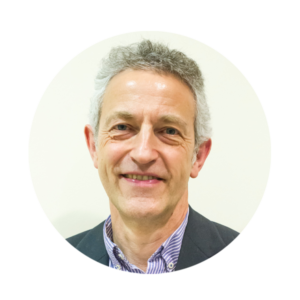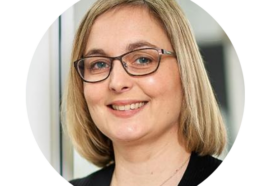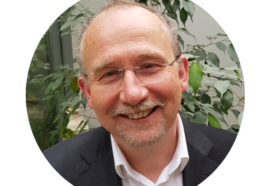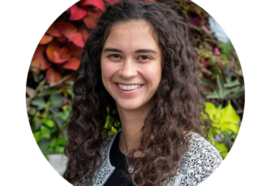In this In Conversation podcast, Dr. Seonaid Anderson is joined by Professor Chris Hollis, who is leading a research team working on a research project about ADHD medication and Tics. The focus of this podcast is on this research project, called The SATURN Trial.
The full name of the trial is the ‘Stimulant Medication for ADHD and Tics – Understanding Response versus Non-stimulants (SATURN): a randomised trial of the clinical and cost-effectiveness of methylphenidate versus Guanfacine for ADHD in children and young people with a co-existing tic disorder’.
Discussion points include:
- Definition of Tics and ADHD.
- Potential challenges of differentiating between tics from a Tic Disorder, such as Tourette Syndrome, from other movements from conditions such as chorea dystonia myoclonus.
- Differentiating between stimming movements and tics.
- The reason behind The SATURN Trial and how it is funded.
- The effectiveness of non-stimulant medication in treating the symptoms of ADHD.
- Co-morbidity and Tic Disorders.
- Impact of the ongoing shortage of ADHD medication on patients.
- Why people should be encouraged to get involved in this research and the clinical implications from this research.
This episode is part of The Association for Child and Adolescent Mental Health’s series on Tourette Syndrome and Tic Disorders. The series explores the evidence-based research on Tourette Syndrome, and other Tic Disorders, as well as the education, treatments, and research in this area.
#ListenLearnLike
Subscribe to ACAMH mental health podcasts on your preferred streaming platform. Just search for ACAMH on; SoundCloud, Spotify, CastBox, Deezer, Google Podcasts, Podcastaddict, JioSaavn, Listen notes, Radio Public, and Radio.com (not available in the EU). Plus we are on Apple Podcasts visit the link or click on the icon, or scan the QR code.

Chris Hollis is Professor of Child & Adolescent Psychiatry at the University of Nottingham, Director of the NIHR MindTech MedTech Co-operative and leads the NIHR Nottingham BRC Mental Health and Technology Theme. His is Principal Investigator on the HTA ORBIT (Online Remote Behavioural Intervention for Tics) trial and led the HTA funded evidence-synthesis and systematic review of treatments for tics in children and young people (Hollis et al. Health Technol Assess, 2016. 20, 1-450) and the AQUA trial of QbTest for ADHD (Hollis et al. Journal of Child Psychology and Psychiatry. 2018 Dec;59(12):1298-1308).
Chris trained in psychiatry at the Maudsley Hospital and Institute of Psychiatry, where he was awarded an MRC Training Fellowship and completed his PhD on the long-term adult outcome adolescent-onset psychosis. He works as a Consultant in Developmental Neuropsychiatry with Nottinghamshire Healthcare NHS Foundation Trust and leads a regional lifespan neurodevelopmental service, including a Tourette’s Clinic and Adult ADHD Clinic based at Queen’s Medical Centre. His clinical and research interests include ADHD, Tourette syndrome, early onset schizophrenia and the development, evaluation and implementation of digital technologies to support better mental health.
As Director of MindTech, Chris is passionate about harnessing digital technology and building its evidence-base in mental healthcare by bringing together patients, clinicians, academics and technology developers. In 2020, Chris was a contributor to the 2020 World Innovation Summit for Health (WISH) report: The digital mental health revolution: Transforming care through innovation and scale-up. He was the recipient of the Association of Child of Child & Adolescent Mental Health (ACAMH) Digital Innovation Award 2020. He recently led the James Lind Alliance priority Setting Partnership’s Top 10 research priorities for digital technology in mental healthcare (Hollis et al. Lancet Psychiatry. 2018 Oct;5(10):845-854). Chris chaired the NICE Guideline for schizophrenia and psychosis in children and young people (2011-13) and was a member of the 2018 NICE ADHD (Update) Guideline Committee. He is a member of Innovate UK’s Digital Health Strategy Group. In 2015, Chris received a prestigious NIHR Senior Investigator Award. This distinguished accolade was awarded for a further 4 years in April 2019. (Bio from University of Nottingham)

Seonaid is a chartered research psychologist and freelance neurodiversity consultant with many years experience in neurodevelopmental disorders. She provides support to research professionals at every stage of the research process and to healthcare experts in their clinical work, for individuals, universities as well as the public sector. She provides specialist advice and guidance on the treatment and management of a range of neurodevelopmental conditions such as autism spectrum disorders (ASD), attention hyperactivity disorder (ADHD), Tourette Syndrome, dyslexia, and mental health. She is on Twitter @Seonaidanderso2 and can be found on LinkedIn.
Other episodes
- Episode One ‘Teens, Tics, and Tech’ – Camilla Babbage ‘In Conversation Tourettes Syndrome’
- Episode Two ‘Education, and Educating, about Tourettes’ – Lucy Toghill ‘In Conversation Tourettes Syndrome’
- Episode Three ‘‘Tics, and Tic Disorders; the sudden onsets and influences of the pandemic’ – In conversation with Dr. Tammy Hedderly’
- Episode Four ‘Cultural Differences in Tics and Tic Disorders’
- Episode Five ‘Tic Disorders and Tourette Syndrome: Exploring the INTEND Project’
Transcript
[00:00:01.300] Dr. Seonaid Anderson: Hello. Welcome to the In Conversation series for the Association for Child and Adolescent Mental Health, or ACAMH for short. I’m Dr. Seonaid Anderson, a Chartered Research Psychologist and Neurodiversity Consultant with expertise in Tourette syndrome. I’m excited to be here today as this is part of our series of podcasts that ACAMH is hosting on Tourette syndrome. And over the course of the series, we’ve been looking at the evidence-based research about Tourette syndrome and other tic disorders, as well as education, treatments, and research in this area.
Today, I’m honoured to be speaking with Professor Chris Hollis, who is leading a research team, working on a research project about ADHD medication and tics. Chris Hollis is Professor of the Child and Adolescent Psychiatry and Director of the NIHR MindTech and of the Faculty of Medicine and Health Sciences at the University of Nottingham. It’s great for you to join me today, Chris. Thank you so much for being here.
[00:01:14.750] Professor Chris Hollis: It’s a real pleasure to speak to you today.
[00:01:17.960] Dr. Seonaid Anderson: Thank you, Chris. So, we’re going to be talking about this current research project called SATURN, and the full title of the project is Stimulant Medication for ADHD and Tics – Understanding Response versus Non-stimulants: a randomised trial of the clinical and cost-effectiveness of methylphenidate versus guanfacine for ADHD in children and young people with a co-existing tic disorder. So, if people are listening and they’re interested in finding out a more information about ADHD or tics and tic disorders like Tourette syndrome, then ACAMH have topic guides on these conditions. But suffice to say, very quickly, that ADHD, or attention-deficit hyperactivity disorder, is a neurodevelopmental disorder characterised by executive dysfunction with symptoms of inattention, hyperactivity, and impulsivity.
Tics are a sudden and repetitive motor movement or vocalisation, and they can be invisible to the observer, such as abdominal tensing or toe crunching, but common motor and phonic tics are eye blinking and throat clearing, for example. So, Chris, my first question would be from a Clinician’s point of view, would it be challenging to differentiate between tics from a tic disorder such as Tourette syndrome from other movements, from conditions such as chorea, dystonia, myoclonus?
[00:02:52.460] Professor Chris Hollis: I think the issue often for tics is that they are actually relatively straightforward to assess and diagnose and have some characteristic features, particularly the urge or the sensation of a warning of a tic, which is often quite characteristic of tics, which is often relieved by the tic itself. But in our practice, the – certainly over the last two or three years, one of the main differentiations have been what’s called functional tics, which are differentiated from primary or neurological tics. And we saw many more of those during the pandemic. And the important point there is that the treatments for tics and primary tics generally don’t work for functional tics. And functional tics have been seen much more commonly with a new onset, often in adolescent females, often quite a sudden severe onset of complex tics. So, a different presentation pattern and certainly something that we’re more aware of and important to differentiate.
[00:04:03.170] Dr. Seonaid Anderson: And what about other movements, such as stimming that is seen with autism spectrum disorders? Is that something that’s difficult to differentiate between the stimming movements and the tics from a neurological disorder like Tourette syndrome?
[00:04:20.200] Professor Chris Hollis: Yes. Well, that’s a really good point because autistic spectrum disorder commonly co-exists with tics, and young people with ASD and tics may have tics and stimming stereotypies, manneristic movements. They can be differentiated in the sense that young people who have the ASD movements tend not to have the simple tics, the simple sounds and facial movement. Their movements are often more what we would describe as complex or light complex tics. But again, they don’t have the premonitory urges, but also they tend to be quite constant rather than waxing and waning in the way that tics do, but they often do co-exist. So, it can be an important consideration to differentiate.
[00:05:13.770] Dr. Seonaid Anderson: And of course, Clinicians listening will be aware as well that ADHD and tics are also commonly found together, and that’s the full focus of the study.
[00:05:27.960] Professor Chris Hollis: Absolutely. So, around 20% or one in five of young people with ADHD do have significant tics. Sometimes they can be under recognised, and in those young people with tic disorders, which disorders affect about 1% of the population, it can be up to 70/80% have co-existing ADHD.
[00:05:53.280] Dr. Seonaid Anderson: So, that’s quite astonishing really, isn’t it?
[00:05:57.340] Professor Chris Hollis: Hmmm.
[00:05:58.340] Dr. Seonaid Anderson: To hear those figures as well. But do you think in – if a child is being seen for ADHD, for example, in a clinic setting and they also have tics, the tics may, sort of, go unrecognised or be seen as less of a priority for the child?
[00:06:15.340] Professor Chris Hollis: That’s commonly the case if – and particularly if the tics are not causing distress or disruption and they may not be the focus of the attention. We’ve certainly also had Clinicians report to us that they’re less – some of them are less confident in their assessment of tics, and often it’s the whether you’re actually including them. If the child is being assessed for ADHD, obviously they need assessment for emotional mood anxiety disorders, particularly also for ASD symptoms and traits, but also for tics ‘cause – as they commonly co-occur.
[00:06:56.690] Dr. Seonaid Anderson: So, Chris, can you explain the reason behind this research study SATURN and how it is funded?
[00:07:04.210] Professor Chris Hollis: It’s really driving and – or trying to answer a fairly simple clinical question. I’m a Clinician as well as an academic and I see young people with ADHD and tic disorders. And it’s really trying to address the question of what is the best medication for these young people? And addressing the uncertainty at the moment about, if you have a young person with ADHD and tics, what is the best treatment? There’s a range of treatments available, stimulant medications and non-stimulant medications. And at the moment, the evidence doesn’t point to which would be the best choice to recommend.
[00:07:44.470] Dr. Seonaid Anderson: And some – in the – in previous discussions, hearing from parents and perhaps some Clinicians as well, there seems to be a concern that stimulants might increase tics and therefore there’s a – they favour prescribing non-stimulant medication to children and young people with ADHD and tics. Is that something you’ve found, as well?
[00:08:07.960] Professor Chris Hollis: That’s right. Certainly, you know, from training and then, you know, medical school and beyond, and if you look at the description of stimulant medications, one of the adverse effects that’s generally quoted in things like the British National Formulary and other places is tics and – or a potential contraindication might be tics or Tourette’s. So, there has been that concern, that, sort of, fear that medication, particularly stimulant medication, which is seen as a – potentially as a dopamine, noradrenaline agonist could make tics worse. And certainly, in individual cases there are reports of that, although it could be coincidental or it could be a genuine response.
We know that at the moment, looking at trials overall as a group, those young people treated with stimulant medications don’t seem to be having an effect where tics are made worse. But that is quite a selective population that tend to enter those treatment trials and addresses less the issue of young people who have a combination already of ADHD and tics and how they’re going to be affected by that treatment.
[00:09:29.000] Dr. Seonaid Anderson: And when I’ve spoken to families before about the issue of ADHD stimulant medication potentially making their child’s tics worse, I’ve also, sort of, said, it’s my understanding that probably – it’s probably due somewhat to the timing of the two neurodevelopmental conditions coming along with ADHD symptoms occurring at a slightly earlier age and then the tics appearing later on in development. Does – have I been a bit inaccurate or is that something that’s generally accepted, as well?
[00:10:01.880] Professor Chris Hollis: I think that’s right. You are – you’ve made a good point that ADHD tends to have its onset earlier. So, perhaps you might be seeing problems at, sort of, age five, six, that, sort of, age, but tics and tic disorders present rather later. So, often tics might emerge at, sort of, age seven to nine, and so, it could just be the natural course and progression that a child with ADHD develops their tics a little bit later, but they’re on ADHD treatment and therefore that’s attributed to the treatment when it’s just the natural course of when tics emerge.
The other factor is that tics, as we said, they fluctuate, they wax and wane, and so, you can get the coincidental waxing increasing of tics after the onset of medication or of starting ADHD medication. So, you do need to wait and see whether that’s actually a causal relationship or whether it’s just the natural fluctuation of tics over time.
[00:11:08.000] Dr. Seonaid Anderson: And so, my understanding in regards to the medications available and the trial – SATURN Trial is looking at two of these medications that – is it true that the non-stimulant medication may be less effective in treating the symptoms of ADHD?
[00:11:26.330] Professor Chris Hollis: There is some evidence. We’ve looked at both in the NICE guideline for ADHD and comparing stimulants and non-stimulant medication, that if you’re just considering young people with ADHD, that stimulants are the most effective treatment of ADHD. Now, that may not always be the case for every individual, but as a group, we would recommend stimulant medications as the first-line and that’s what you see in the NICE guidance.
However, NICE guidelines are written in a slightly artificial way for individual – sort of, spec – individual conditions, but actually, in the real world, people and young people have a mixture of conditions. Comorbidity is the rule with neurodevelopmental disorders. And so, the guidelines are of limited help really, in terms of making treatment decisions, but certainly if your priority is treating ADHD, even with co-existing conditions, then generally, we would tend to recommend stimulant medication.
[00:12:35.430] Dr. Seonaid Anderson: And you mentioned the NICE guidelines for – there for ADHD and currently, there are no NICE guidelines for tics or tic disorders.
[00:12:46.390] Professor Chris Hollis: That’s right. So, we have – we’ve produced a number of reviews. There is a European guideline for tics and tic disorders, but they’re not based on the same systematic review and the same methodology that NICE views. So, you’re absolutely right. There is a gap and it’s actually quite an important gap and we are continuing to press for a NICE guideline – NICE guidance for tics and tic disorders.
However, this study, the SATURN Trial will actually, you know, contribute significantly to that information because as I said, the knowledge we have from trials tends to be in quite refined groups that don’t necessarily affect clinical practice. So, it would be usually young people with ADHD, but without often excluded those with comorbidities, particularly say a tic disorder. Although we tend to know what works best for children with ADHD, often without other significant conditions. We know much less than – for those young people who have a combination of ADHD and tics.
[00:13:54.399] Dr. Seonaid Anderson: Hmmm, and it seems to be with tics and Tourette syndrome that actually having a comorbidity, whether that’s ADHD or OCD, is actually much more likely than having a, kind of, pure form of tics or Tourette syndrome.
[00:14:11.920] Professor Chris Hollis: That’s right, and therefore, you know, in the clinics and the clinic I run, you – we very rarely see young people just with tics. And our treatment decisions and our thinking is often about how to manage a combination of different conditions and symptoms and balance that. And so, a study like SATURN is really addressing that, sort of, clinical reality and the uncertainty about what is the best treatment to recommend.
[00:14:47.810] Dr. Seonaid Anderson: So, looking at this research study, families from across England who have a child or a young person between six and 16 years old with ADHD and tics can take part. And I think an interesting part of this is that the child or young person does not need to have been assessed by a professional for tics before or have been diagnosed with a tic disorder to be involved.
[00:15:14.560] Professor Chris Hollis: Yes, that’s right, and it reflects that tics occur obviously with a range of severity. And we’re really interested in recruiting young people who may have tics where there’s a suspicion of tics with ADHD, but not necessarily those who’ve had a tic disorder diagnosis, which is actually quite rare and it’s quite difficult to get. So, that would really restrict the population of young people that would enter the study. So, the requirement is, as you said, their age, but also that they have an ADHD diagnosis, but really any suspicion of tics, but not a requirement they’ve had a – say, a formal assessment or diagnosis.
[00:16:01.960] Dr. Seonaid Anderson: Hmmm hmm. So, that really opens it up, doesn’t it? And does it matter if people who might be involved in the study are already on medication for their ADHD?
[00:16:14.089] Professor Chris Hollis: No, not at all. So, we’re recruiting those who are so-called naive to medication or ADHD medication, so that they may just be having their first assessment or being considered for medication. So, that’s one group, but a second group are those where they are looking for a change of medication. So, it may be that they’ve been on ADHD medication and they’ve had a poor response or they’ve had potential side effects and they’re considering a change or switch of medication.
[00:16:46.449] Dr. Seonaid Anderson: And would that be complicated? I’m thinking from a parent’s point of view, I guess, would that be a complicated thing to do to change medication as part of the trial?
[00:16:58.079] Professor Chris Hollis: Not particularly complicated. It just reflects standard practice. So, the – all the young people in the trial will be part of an existing clinical service, or they’ll be under a team and a Clinician who refers young people into the study. And that referring Clinician, either generally would be a child and Adolescent Psychiatrist or Paediatrician or a member of their team as prescribers, would be looking normally to review that child’s medication and organise a switch, which usually involves a gradual reduction of their medication, a washout period, and then a reintroduction of new medication. So, that process really is quite standard, quite routine and all we’re doing really is adding in the factor of randomisation. So, we’re giving – essentially, there’s going to be two potential options of treatment depending on which arm they’re random – the young person is randomised to.
[00:17:59.900] Dr. Seonaid Anderson: And will you ask at some point, I would imagine towards the end of the study, how did medication – how the patients and their families, which medication they prefer? Do you think you might find that participants in the research may have an increase in tics, but they’re willing to put up with it because they prefer that medication type, or how would you respond to?
[00:18:27.760] Professor Chris Hollis: It’s a really important point. We won’t be, in a sense, giving each individual both medications. So, they won’t have a, sort of, comparison to make. Although they may have been on a medication before. So, if it – they’re in that group, they’ll be able to compare to that medication, but we’re looking at the response of that young person to the medication they’re allocated to, and that response is both in terms of symptoms that we’ll be measuring. So, ADHD symptoms, improvements and tics, though improvements in tics and certainly not worsening of tics, but also wider, what we call global functioning and quality of life. So, young people and their parents will be asked about how they’re doing in general and, you know, not just how their symptoms are being treated, but how this treatment is improving – reducing impairment, improving their quality of life. So, they will certainly be able to have a view on that and those broader outcomes are really important. And as part of the study, they will be having regular medication reviews, young people and their parents, and a chance to contribute information about how they’re managing with that treatment, about potential adverse effects, and that will all be taken into account with the – in the trial.
[00:19:53.440] Dr. Seonaid Anderson: And while we’re on the subject of ADHD medication, it’s been quite well publicised that there has been, sort of, ongoing medication shortage of ADHD medication in the UK. Has that had an impact on patients? You know, what would you – how would you respond to that question?
[00:20:17.460] Professor Chris Hollis: Well, it’s been well published – publicised, but also it’s really, you know, I’ve had experience of patients, in our own clinic as well as through the trial, who’ve really had to struggle to obtain medication, and for a period, they’ve not really been able to find any at all, which is incredibly anxiety-provoking, distressing, obviously in terms of not having their condition managed. And some parents have had to travel literally hundreds of miles, sometimes going to pharmacies in different parts of the country trying to chase down access to ADHD medication, as well as medications that are like clonidine or guanfacine, which is part of this trial and is used in tic treatments. So, it’s a – it has had an impact on the trial itself, obviously, generally, where these medications have been available, we haven’t been able to prescribe or randomise young people in the trial.
And at the moment, as we’re speaking, things are – if the last few weeks are looking a little better, but it’s – it shows that there’s a lot of pressure on these medication supplies. And we’re really pleased that we’ve had a lot of support to try to continue the trial because obviously, you know, without access to medication, you know, we can’t progress with the trial itself. But we’re hopeful that things are moving forward and looking a little bit more promising over the next few months.
[00:21:54.450] Dr. Seonaid Anderson: So, thanks for that, Chris. I’m lucky enough to be working on the public and patient involvement side, helping out on the SATURN projects. And we are looking for parents of children from six to 16 years old in England who have ADHD and tics to join the PPI panel that we’re having as part of the research project. And of course, that’s vital to helping us shape and look at the research study and how it works for people and really calling on people to use their lived experience to help guide the research and give input and people can, of course, get involved with that.
I’m going to give the email address at the end, but can you tell us, Chris, why you think people should be encouraged to get involved in this research? What are the clinical implications that could come from this research and, you know, in regards to healthcare professionals, how would they – if they were interested, how would they get in touch?
[00:23:05.390] Professor Chris Hollis: Yeah. Well, thanks for highlighting that Seonaid, both of the emails saturn@nottingham.ac.uk, which you’ll – and also the website. I think it’s really important to see that there should be a – really a right for young people to take part in research. And that we increase the access and opportunity for young people to take part in research trials for a number of reasons.
Firstly, ‘cause we know that the quality of care is often better. We have the resources to support care in clinical trials. And so, the – people across the age range who take part in research have access to very good clinical care.
I think the other point is that there’s really a right to have access to evidence-based treatments and therapies. The amount of young people in – particularly in mental health services who take part in research, particularly medication research is really very low, much lower than other areas of healthcare. And as a result, often they don’t have the same access to evidence-based treatments. And as a result also, the infrastructure to support research trials, to support Clinicians in terms of identification, recruitment of participants, is really underdeveloped often in those services.
So, in terms of SATURN, Clinicians who do refer into the trial, the SATURN team has a research Clinician and they manage the medication, the initiation, the titration, monitoring for the first three months of that trial. So, it – there really is an advantage in having a research team involved in their care, which then transfers back to the usual care team at three months and then we follow-up to one year. So, there are advantages to the team, but also to the young people who take part in it. But we recognise that there needs to be better infrastructure, better support to make it easier and to, sort of, reduce the friction of taking part in research studies for Clinicians and young people.
[00:25:26.600] Dr. Seonaid Anderson: Chris, that’s a great overview to end with there. Thank you so much for speaking with me today. It’s been really fascinating and I hope helpful for many people listening. I’m going to give now the details of how people can get in touch with the SATURN research team. The SATURN email is saturn@nottingham.ac.uk and there’s also a Twitter or X account and that is @Saturn_Study. And the website details will also go along with this podcast.
You can follow me, Dr. Seonaid Anderson on Twitter @Seonaidanderso2, and also visit my website, www.neuro-diverse.org. For more details on Tourette syndrome, please visit the ACAMH website, that’s www.acamh.org, and you can follow them on social media by searching ACAMH, A-C-A-M-H. Thank you so much for listening.




